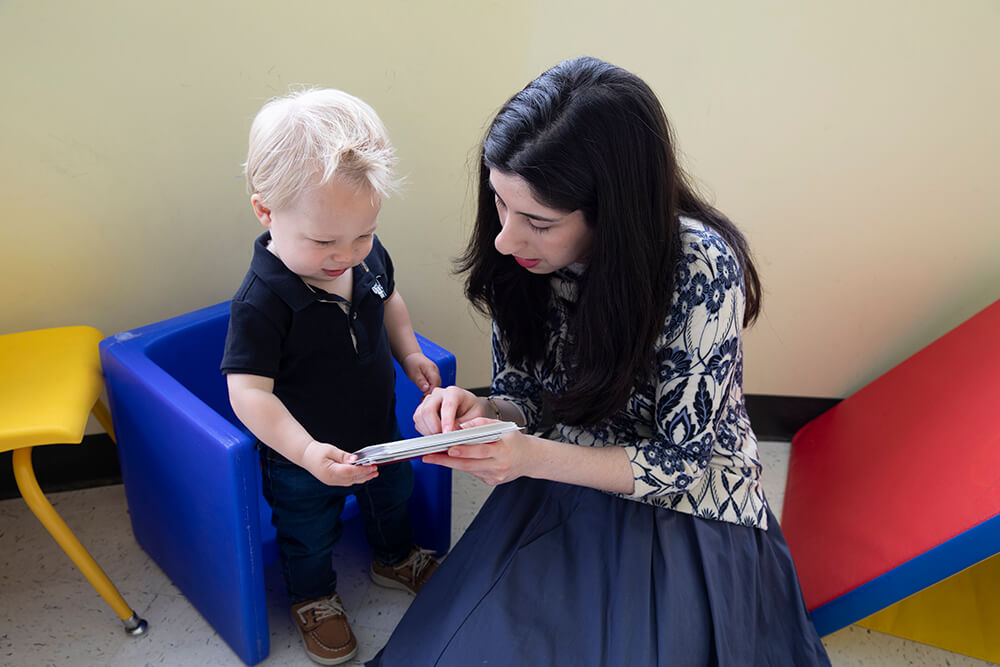The Many Career Options for a Speech-Language Pathologist
A Master’s Degree in Speech Can Lead to Jobs in Schools, Hospitals and Corporations

When most people think of speech or language therapy they usually remember the “speech teacher” from elementary school or the speech therapist that is working on their friend’s child’s lisp or a child having difficulty saying the “r” sound. Unless you have had direct experience with the vast and varied assessments, interventions and services provided by speech-language pathologists, you may not fully realize the amount of training, skill and the broad scope of practice involved.
To learn the required skills and knowledge that it takes to become a speech-language pathologist, professionals must complete a bachelor’s degree with numerous prerequisite coursework and clinical observation hours. A challenging master’s degree program follows, which includes academic coursework, hundreds of hours of closely supervised direct clinical practice with adults and children, passing a Praxis examination approved by the American Speech-Language-Hearing Association, and finally, after successfully completing all of these requirements, the prospective candidate must complete a supervised clinical fellowship year in an actual work setting.
Speech-language pathologists will then be certified by the American Speech-Language-Hearing Association, licensed by the state in which they practice, and then can begin to work independently. These credentials will enable speech-language pathologists to work in a variety of settings and allow their services to be reimbursed by private insurance companies, including Medicare.
How Speech Pathology Helps People Communicate
Beyond treating difficulties with “pronunciation” (speech sound production) or working with language difficulty (comprehension and expression), speech-language pathologists are trained to assist patients or clients in many aspects of communication and swallowing that one might not be aware of. Our speech is carried through our voice, which is created by coordinating breathing, vocal cord vibration and rapid movements of the articulators. Numerous medical and functional conditions may cause problems with our voices including hoarseness, breathiness, raspiness, reduced volume or problems with pitch and intonation. Individuals with cancer may lose part of their vocal cord or the entire larynx. Vocal cord nodules, paralysis, effects of a stroke or neurological conditions such as Parkinson’s disease will all negatively affect the voice. Speech-language pathologists are trained to work with difficulties of voice, provide vocal rehabilitation and counseling, and assist patients in recovering their voice or, if that is not possible, maximizing their function to allow for effective communication.
Social Language Disorders
Language Pragmatics refers to how we actually use language with others in social and everyday contexts. Recognizing listener needs, maintaining eye contact, reading body language and facial expression and modifying our language to fit social situations are skills we use in our everyday interactions with others. Various diagnoses, such as autism, social pragmatic language disorders and traumatic and right hemisphere brain injury may cause difficulties with pragmatic language skills. Speech-language pathologists work with adults and children individually or in small groups to help individuals with social pragmatic language difficulties to become more effective communicators and improve social skills through a variety of strategies.
Neurological and Other Disorders
Unfortunately, there are times when individuals are unable to use typical means of communication. A stroke, a neurological disease such as ALS, or a disorder, such as cerebral palsy, may make it extremely difficult or impossible for individuals to communicate in a typical manner. Many of us are familiar with the prolific physicist and author Stephen Hawkings, who had early onset ALS (Lou Gehrig’s Disease) and lost his speech and ability to communicate. Hawkings was able to communicate through an artificial speech-generating device, likely learning this new technique with assistance from a speech-language pathologist. Speech pathologists evaluate individuals in need of such devices and provide interventions to patients and their families to allow continued communication. These systems may vary from a single application on an iPad to state-of-the-art sophisticated computer systems that will enable an individual to speak and write.
Language and Literacy
Speech-language pathologists can help with both reading and writing. With expertise in language, development of speech sounds and the understanding and processing of language, speech-language pathologists are uniquely qualified to support individuals in the area of literacy. The American Speech-Language-Hearing Association has established that language and literacy through tutoring and work with children, adolescents and adults with language-based learning, reading and writing difficulties is within the professional scope of practice of speech-language pathologists.
Corporate Settings
Speech-language pathologists are also often called on in corporate, professional and even entertainment settings to help individuals modify, improve and enhance communication skills. Speech pathologists are trained to reduce or eliminate unwanted accents, to improve public speaking and eventually build confidence through strengthening an individual’s ability to communicate in public or private settings. Speech pathologists have worked with actors to do just the opposite and add accents, dialects or manners of speaking to better convey a character, emotion or foreign dialect. You may not know it was actually a speech pathologist who worked with Dustin Hoffman to allow him to be believable as a female housekeeper.
These are but a few of the varied areas of communication that speech–language pathologists encounter in their daily practice. There is an area of specialty for all speech pathologists, whether it be working with adults, children or infants in settings from hospitals to schools. It is a rewarding career for those who choose to enter the profession.
Steven Blaustein is an associate professor in the Touro College Master's Program in Speech-Language Pathology. He has over 40 years of clinical and teaching experience and has worked in a variety of settings including hospital program director, consultant to schools and preschools and advocate for individuals with communication disorders.

